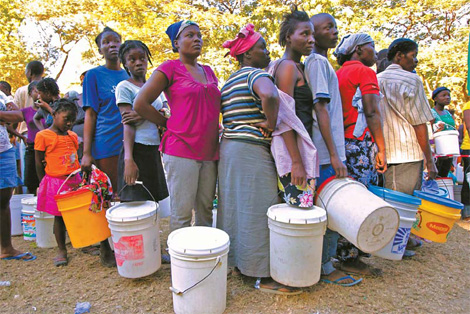UN chief wants more aid for Haiti
Nine days after a 7.0-magnitude earthquake devastated Haiti, United Nations Secretary-General Ban Ki-moon said it is time to "move from emergency response to ongoing relief and eventual reconstruction of the Haitian economy".
Ban made his remarks during a press briefing on Thursday at the UN headquarters.
The Secretary-General outlined three priorities for the Haitian earthquake relief work: continuing to provide humanitarian assistance; providing security and stability for the people; and reconstruction of the Haitian economy.
The first two steps have seen progress, according to UN officials. The road corridor between the Dominican Republic and Haiti has been improved to speed up deliveries of essentials to Haitians. According to Ban's spokesman, Martin Nesirky, the Haitian government has accepted 150 military personnel from the Dominican Republic to join the UN Stabilization Mission in Haiti to secure the corridor.
The proposal for more troops has received a "positive response" from UN members, the secretary-general said.
|
People wait in line to fill containers with water at a refugee camp in Port-au-Prince on Thursday. |
With regard to the reconstruction of the Haitian economy, Ban said a post-earthquake assessment would be undertaken soon.
Former US president Bill Clinton, the UN special envoy to Haiti, has agreed to lead the organization's cash-for-work program, a project that provides employment opportunities for Haitians.
"It's really important to try to continue to get the immediate emergency aid up to scale," he said. The cash-for-work program is a logical step in this direction, said Clinton.
According to Ban, more international assistance will be needed in addition to the $575 million used for the emergency response, to help Haiti restore its economy.
The government will soon move 400,000 people rendered homeless by the earthquake, from their squalid, improvised camps in the shattered capital to new resettlement areas on the outskirts, a top Haitian official said Thursday.
Authorities are also deeply concerned about sanitation and disease outbreaks in makeshift settlements like the one on the city's central Champs de Mars plaza, said Fritz Longchamp, chief of staff to President Rene Preval.
"The Champ de Mars is no place for 1,000 or 10,000 people," Longchamp told The Associated Press. "They are going to places where they will have at least some adequate facilities."
He said buses would start moving the displaced people within a week to 10 days, once new camps are ready. Brazilian UN peacekeepers are already leveling land in the suburb of Croix des Bouquets for a new tent city, the Geneva-based intergovernmental International Organization for Migration reported Thursday.
The death toll from the Jan 12 earthquake is reported to have exceeded 200,000, though precise figures have been difficult to ascertain.
As of Thursday morning, 61 UN officials have been confirmed dead from the earthquake.
 0
0 







